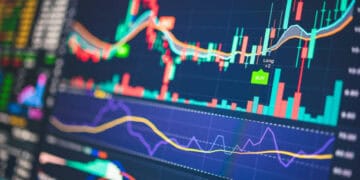In recent times, European markets have experienced a significant boost in luxury sales, marking a positive development for the region. However, this trend has also prompted inquiries about Europe’s increasing reliance on an industry often perceived as emblematic of extravagance.
Comparing Europe to the United States, where the top ten tech companies have contributed to a substantial portion of stock market gains, we observe a parallel concern in Europe. In the European context, the top ten luxury stocks, including renowned names like LVMH and Ferrari, have accounted for roughly 30% of returns, a figure unseen in historical records.
The luxury sector, long a source of European pride, has flourished over the past decade, even achieving record-breaking performance during the pandemic. Extensive stimulus efforts injected trillions of dollars into the global economy, a significant portion of which ended up in the hands of the affluent. Consequently, Europe, with its historical influence in luxury, is now reaping substantial benefits. Approximately two-thirds of global luxury sales revenues are directed toward Europe, and this newfound prosperity is evident in the continent’s stock market standings.
Traditionally dominated by banks, utilities, and industrial conglomerates, Europe’s list of top ten companies by market capitalization has shifted to include four luxury brands, a transformation that began in the early 2010s. Notably, these luxury brands have demonstrated profitability rivaling that of major U.S. tech companies, with earnings comprising nearly 25% of their revenue.
While the luxury industry’s progress is noteworthy, it raises questions about Europe’s future trajectory. Building a knowledge-based economy primarily on centuries-old craftsmanship appears regressive at a time when Western capitalism grapples with sluggish productivity growth, escalating wealth inequality, and the complexities of navigating its relationship with China.
In contrast to the uncertain productivity contributions of smartphones, it’s evident that French perfume and Italian handbags offer comparatively limited economic growth. While tech moguls in the United States face controversy, their counterparts in the luxury sector, particularly in France, often encounter protests. Additionally, as the West deliberates on “derisking” its ties with China, Europe’s luxury industry remains heavily dependent on Chinese consumers, who now constitute approximately one-third of its sales.
Just as U.S. tech giants have expanded their influence over the past decade, European luxury brands have similarly grown. Since 2010, the top ten tech firms in the U.S. have quadrupled their share of the American stock market to nearly 25%. Over the same period, the ten largest luxury stocks in Europe have roughly tripled their share of the European markets to nearly 15%, with significant gains observed in the past year.
In both luxury and tech sectors, power increasingly consolidates at the upper echelons. Europe’s leading luxury brands now contribute to one-third of global sales, a notable increase from one-quarter in 2010. The top four luxury companies in Europe by market capitalization—LVMH, L’Oréal, Hermès, and Christian Dior (owned by LVMH)—are all of French origin.
The roots of French dominance in luxury can be traced back to a heritage dating to the court of Louis XIV and a corporate takeover culture initiated by Bernard Arnault. After acquiring LVMH in 1989, Arnault embarked on a journey to create the first conglomerate of luxury brands through successive acquisitions. This trend has been mirrored by competitors, leading to an industry where small Italian artisans craft luxury goods, but these are marketed and sold by major French conglomerates, such as Gucci, Bulgari, and Fendi.
While U.S. tech companies overshadow their rivals, the same can be said of French luxury brands, which boast annual sales three times higher than Swiss counterparts, more than four times that of American and Chinese competitors, and twelve times that of Italian counterparts.
For instance, in April, LVMH became the first European company to surpass the half-trillion-dollar mark, while Hermès boasts profit margins exceeding 40%, up from 25% in 2010 and surpassing even Microsoft, the most profitable of the major tech firms.
One factor contributing to these exceptional profits is the luxury industry’s pricing power. Luxury companies cater to a clientele increasingly unconstrained by price sensitivity. The price of a Chanel handbag, for instance, has doubled over the past five years to reach $10,000, significantly outpacing general consumer price inflation during the same period.
While Europe can celebrate its newfound success, it’s essential to recognize the advantages of competition over concentration within capitalism. Faced with the choice between concentrating on high tech or high luxury, the preference leans towards the former. Europe’s reliance on the luxury sector, rooted in centuries-old traditions, may appear somewhat antiquated, if not decadent, in the present economic landscape.
Catch the latest in supply chain news on The Supply Chain Report. Visit ADAMftd.com for free international trade tools.
#EuropeanLuxuryGrowth #LuxuryMarketBoom #LVMH #Ferrari #LuxurySector #EuropeLuxuryStocks #EuropeanEconomicRise #TechVsLuxury #LVMHStock #FerrariStock #LOréal #Hermès #ChristianDior #FrenchLuxuryDominance #ItalianLuxury #LuxuryPricingPower #LuxuryGoodsMarket















